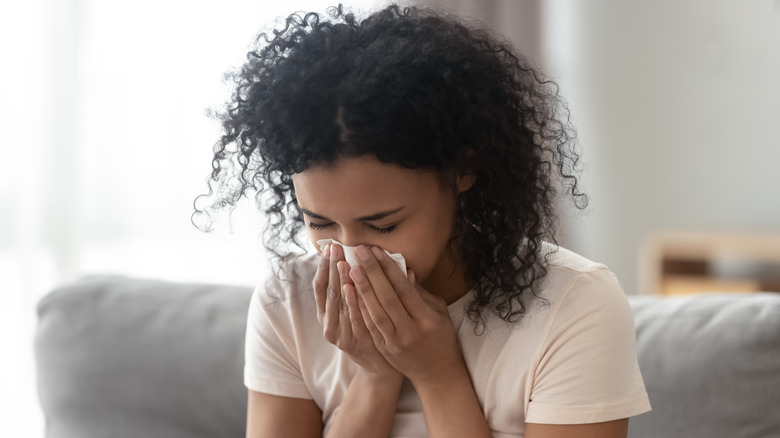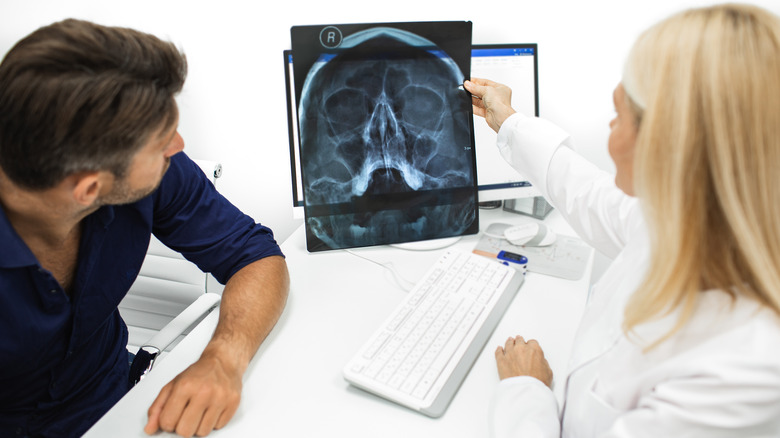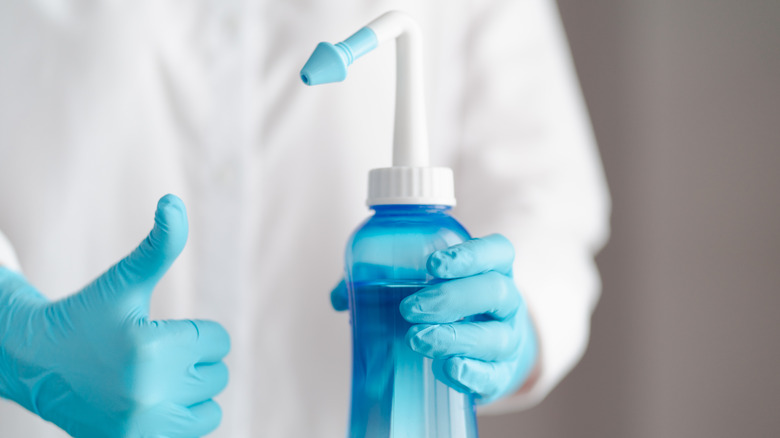Signs You Might Have A Sinus Infection
Seasonal allergies are worse than ever, and many people are experiencing a greater severity of symptoms. These symptoms could lead to a sinus infection, also called sinusitis, which affects 31 million people a year, according to the American College of Allergy, Asthma & Immunology.
There are four hollow spaces — paranasal sinuses — above your eyes, behind your nose, and in your cheekbones, per WebMD. They contain a lining of tissue and mucus that drains out of the nose to help keep it clean. But if something doesn't allow the mucus to drain, it can cause a sinus infection.
Symptoms include congestion, runny nose, fever, feeling more tired than usual, teeth pain, headaches that you feel in your forehead, postnasal drip, cough, sore throat, bad breath, swelling and tenderness in your face, and a reduced sense of smell or taste (via WebMD, Healthline). Let's look at the different types of sinusitis.
Types of sinusitis
There are two main types of sinus infections: acute and chronic. An acute sinus infection lasts four weeks or less. Chronic sinusitis lasts 12 weeks or even longer, or when you have three or more cases of sinus infections within a year (via the American Academy of Allergy, Asthma, and Immunology).
Sinusitis can be viral, bacterial, or rarely even fungal, Healthline explained. If you have a viral infection, no antibiotics are needed as it will go away on its own within 10 to 14 days. If symptoms don't improve after 10 days, however, you could have a bacterial sinus infection that requires antibiotics (via Cleveland Clinic).
If you think you may have chronic sinusitis, make an appointment with your doctor for an official diagnosis, possible referral to an allergist, and inquire about antibiotics. In the meantime, there are some things you can do to relieve your symptoms.
How to treat a sinus infection
You may need a few medications to help relieve your symptoms, like a decongestant, antihistamine, a nasal saline spray, and a steroid nasal spray (via Healthline). Take these as directed, and don't forget some boxes of tissues — the kind with lotion, so they don't irritate your nose as much as the others. Make sure any over-the-counter medications are safe for you to take. If you have any health conditions, especially glaucoma, high blood pressure, prostate problems, or sleep difficulties, ask your doctor before taking anything, Healthline advised.
Consider getting a nasal irrigation kit that comes with prepared saline packages. Saline rinses can also prevent allergies and sinus infections, so keep using it once in the morning and once at night (via Harvard Health Publishing). Drink plenty of water to stay hydrated. And if your symptoms don't start getting better or start getting worse, consult your doctor.
How to prevent sinus infections
You're most at risk for sinus infections if you smoke, have allergies, asthma, a weak immune system, any blockages in your sinuses, or have just gotten over a cold or have a cold that doesn't seem to be going away (via Cleveland Clinic). You might mistake a sinus infection for a cold because a cold can turn into sinusitis.
To prevent sinus infections and improve your overall health, the Cleveland Clinic recommends quitting smoking. If you have outdoor allergens like pollen, keep your windows closed, use filters in your heating and cooling system, wear a mask when you go outside, and take a shower and wash your clothes after coming indoors (via Asthma and Allergy Foundation of America). Additionally, wash your hands frequently, avoid touching your face to prevent illness, and clean and disinfect your home regularly. Use a humidifier at home, especially in your bedroom, to keep the air moist. Dry air isn't good for you if you're prone to sinus problems (via Everyday Health).




